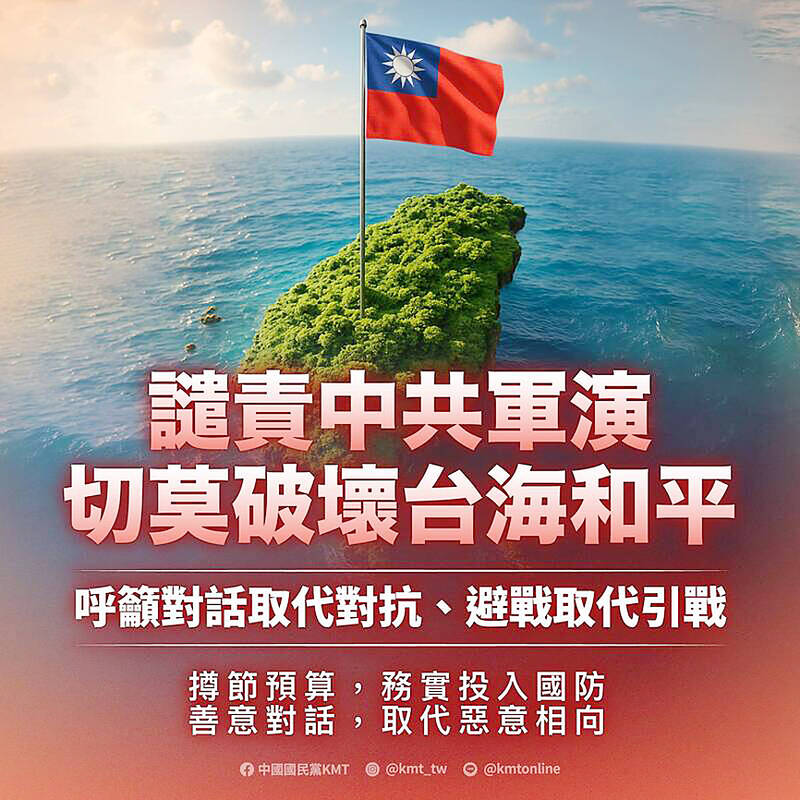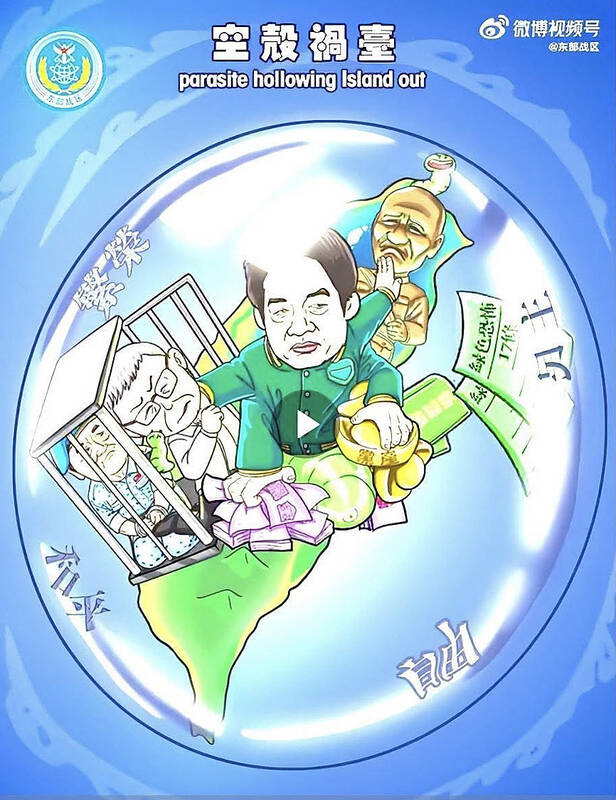The Chinese Nationalist Party (KMT) is maintaining close ties with Beijing, the Democratic Progressive Party (DPP) said yesterday, hours after a new round of Chinese military drills in the Taiwan Strait began.
Political parties in a democracy have a responsibility to be loyal to the nation and defend its sovereignty, DPP spokesman Justin Wu (吳崢) told a news conference in Taipei.
His comments came hours after Beijing announced via Chinese state media that the Chinese People’s Liberation Army’s Eastern Theater Command was holding large-scale drills simulating a multi-pronged attack on Taiwan.

Photo: Liao Cheng-hui, Taipei Times
Contrary to the KMT’s claims that it is staunchly anti-communist, KMT Deputy Chairman Andrew Hsia (夏立言) a day earlier visited top Chinese Communist Party (CCP) officials in Henan Province, Wu said, adding that Hsia did not condemn Bejing’s communism, saber rattling or disruption of regional peace, but instead voiced support for the so-called “1992 consensus.”
The “1992 consensus” — a term that former Mainland Affairs Council chairman Su Chi (蘇起) in 2006 admitted making up in 2000 — refers to a tacit understanding between the KMT and the CCP that both sides of the Taiwan Strait acknowledge that there is “one China,” with each side having its own interpretation of what “China” means.
Hsia’s failure to stand up to Beijing proved that claims of being anti-communist were just empty words by KMT Chairman Eric Chu (朱立倫) to placate voters, Wu said.

Photo: Screen grab from the Chinese Nationalist Party’s (KMT) Facebook page
Separately, the KMT, responding to the reports of China’s military drills, called on “the other side [of the Taiwan Strait] to lay down its arms” amid what it called “spiraling hostility across the two sides” brought about by the national security measures of the administration of President William Lai (賴清德).
The Lai administration should replace confrontation with dialogue and avoid war instead of provoking one, it added.
The KMT’s self-styled “2D strategy” — advocating “defense” and “dialogue” — is the best expression of patriotism and hope for defending Taiwan’s security, it said.

Photo: Screen grab from Sina Weibo
The party is to continue supporting military service salary and benefit increases as the foundation of national defense, it said.
Meanwhile, the Taiwan People’s Party (TPP) in a statement protested and condemned the actions of China’s Eastern Theater Command and the CCP’s threat to take Taiwan by force.
Beijing’s military actions conducted in the name of suppressing Taiwanese independence is an attack on all Taiwanese and international norms, the TPP said.
On the Eastern Theater Command’s release of propaganda, including an image showing Lai choking former Taipei mayor Ko Wen-je (柯文哲), the TPP’s founding chairman, and locking him in jail — linking its drills to Ko’s detention — the TPP said that Ko’s legal situation is not Beijing’s concern.
Taiwan is a democracy and uses the rule of law to resolve problems, it said, adding that the nation would not allow outside forces to sow division or meddle in its internal affairs.
The TPP supports efforts to bolster national defense and democratic resilience without forgoing the pursuit of diplomatic discourse to avoid further escalation of tensions across the Strait, it added.
Su Tzu-yun (蘇紫雲), a research fellow at the Institute for National Defense and Security Research, said that the drills are a response to new military strategies recently released by the US, which prioritize deterring a Chinese invasion of Taiwan.
Whenever the international community shows significant support for Taiwan, China uses military exercises to intimidate the nation, Su said.
With the downfall of He Weidong (何衛東), vice chairman of China’s Central Military Commission, and the disappearance of Eastern Theater Command Director Lin Xiangyang (林向陽), the Chinese military is also using the drills to control morale, Su said.
Additional reporting by Lin Che-yuan and Chen Yu-fu

‘DENIAL DEFENSE’: The US would increase its military presence with uncrewed ships, and submarines, while boosting defense in the Indo-Pacific, a Pete Hegseth memo said The US is reorienting its military strategy to focus primarily on deterring a potential Chinese invasion of Taiwan, a memo signed by US Secretary of Defense Pete Hegseth showed. The memo also called on Taiwan to increase its defense spending. The document, known as the “Interim National Defense Strategic Guidance,” was distributed this month and detailed the national defense plans of US President Donald Trump’s administration, an article in the Washington Post said on Saturday. It outlines how the US can prepare for a potential war with China and defend itself from threats in the “near abroad,” including Greenland and the Panama

A wild live dugong was found in Taiwan for the first time in 88 years, after it was accidentally caught by a fisher’s net on Tuesday in Yilan County’s Fenniaolin (粉鳥林). This is the first sighting of the species in Taiwan since 1937, having already been considered “extinct” in the country and considered as “vulnerable” by the International Union for Conservation of Nature. A fisher surnamed Chen (陳) went to Fenniaolin to collect the fish in his netting, but instead caught a 3m long, 500kg dugong. The fisher released the animal back into the wild, not realizing it was an endangered species at

The High Prosecutors’ Office yesterday withdrew an appeal against the acquittal of a former bank manager 22 years after his death, marking Taiwan’s first instance of prosecutors rendering posthumous justice to a wrongfully convicted defendant. Chu Ching-en (諸慶恩) — formerly a manager at the Taipei branch of BNP Paribas — was in 1999 accused by Weng Mao-chung (翁茂鍾), then-president of Chia Her Industrial Co, of forging a request for a fixed deposit of US$10 million by I-Hwa Industrial Co, a subsidiary of Chia Her, which was used as collateral. Chu was ruled not guilty in the first trial, but was found guilty

DEADLOCK: As the commission is unable to forum a quorum to review license renewal applications, the channel operators are not at fault and can air past their license date The National Communications Commission (NCC) yesterday said that the Public Television Service (PTS) and 36 other television and radio broadcasters could continue airing, despite the commission’s inability to meet a quorum to review their license renewal applications. The licenses of PTS and the other channels are set to expire between this month and June. The National Communications Commission Organization Act (國家通訊傳播委員會組織法) stipulates that the commission must meet the mandated quorum of four to hold a valid meeting. The seven-member commission currently has only three commissioners. “We have informed the channel operators of the progress we have made in reviewing their license renewal applications, and